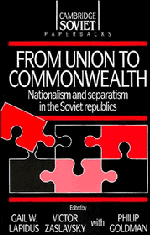Book contents
- Frontmatter
- Contents
- Notes on the contributors
- Preface
- Glossary
- Map: the Soviet Successor States
- 1 Introduction: Soviet federalism – its origins, evolution, and demise
- 2 State, civil society, and ethnic cultural consolidation in the USSR – roots of the national question
- 3 From democratization to disintegration: the impact of perestroika on the national question
- 4 The evolution of separatism in Soviet society under Gorbachev
- 5 Perestroika and the ethnic consciousness of Russians
- 6 Nationality policies in the period of perestroika: some comments from a political actor
- Index
2 - State, civil society, and ethnic cultural consolidation in the USSR – roots of the national question
Published online by Cambridge University Press: 03 May 2011
- Frontmatter
- Contents
- Notes on the contributors
- Preface
- Glossary
- Map: the Soviet Successor States
- 1 Introduction: Soviet federalism – its origins, evolution, and demise
- 2 State, civil society, and ethnic cultural consolidation in the USSR – roots of the national question
- 3 From democratization to disintegration: the impact of perestroika on the national question
- 4 The evolution of separatism in Soviet society under Gorbachev
- 5 Perestroika and the ethnic consciousness of Russians
- 6 Nationality policies in the period of perestroika: some comments from a political actor
- Index
Summary
The explosions of ethnic nationalism and separatism in Gorbachev's Soviet Union seem to confirm the metaphor of empire as appropriate to the Soviet regime. A century and a half ago the European traveller, the Marquis de Custine, called the tsarist empire “the prison house of nations,” and that term has enjoyed a long run as a description of the imperialism of tsardom's Soviet successor. The Soviet slogans that masked ethnic tensions and inequalities, the rhetoric of internationalism and druzhba narodov, have been overwhelmed by the rainbow of national flags that proclaim the self-assertion of peoples whose identities had long been contained within prescribed formulae. Nations have emerged within the empire, and in that emergence the empire has begun to die. After the coup in August 1991, it appears unlikely that it will miraculously spring back to life, or in its death agony transform itself into a new democratic multinational state. But what supra-state formation may emerge in the new constellation of “independent” states is, of course, one of the key political questions of our time.
Conventionally empire is understood to be a large state made up of many peoples or nationalities, ruled by a central power that usually represents one people holding a privileged position in the political and social hierarchy of the empire.
- Type
- Chapter
- Information
- From Union to CommonwealthNationalism and Separatism in the Soviet Republics, pp. 22 - 44Publisher: Cambridge University PressPrint publication year: 1992
- 7
- Cited by

